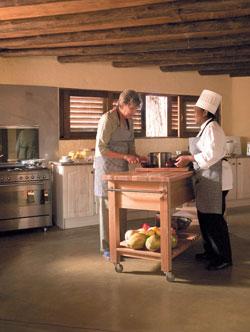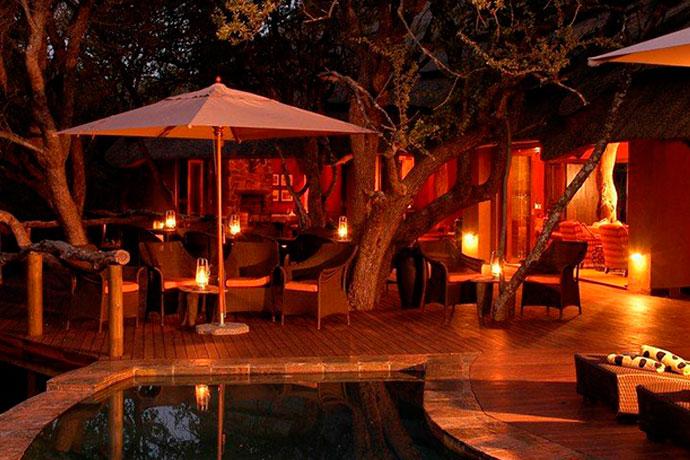 Judi Dyason is renowned in South African culinary circles for her valuable contribution to the local food industry. Leigh Herringer visited her bush kitchen at Motswiri Private Safari Lodge and returned with good memories and great recipes.
Judi Dyason is renowned in South African culinary circles for her valuable contribution to the local food industry. Leigh Herringer visited her bush kitchen at Motswiri Private Safari Lodge and returned with good memories and great recipes.
I’m having a senior moment,” sighs Judi Dyason. “I can’t seem to recall the last ingredient for my rusk recipe and it’s on the tip of my tongue.” This slight lapse in memory is perfectly understandable. You see, she’s also scoring calamari tubes, whisking egg whites for the meringue roulade and plating the food for our shoot. But as I quickly discover, multitasking is exactly what Judi thrives on.I even find myself wondering whether it’s her secret to such graceful ageing.
Or maybe it just comes with the territory – living in a place where doors don’t need to be locked, keys can be left in the ignition and rush hour means a herd of elephants is crossing the road. “It’s truly wonderful here,” says Judi, “but it’s by no means relaxing. Most days I don’t have a second to myself but I honestly think working with food keeps me young because I’m so inspired by it.” At 64, Judi is a chef, founding principal, doting grandmother and mentor, and she has no shortage of stories to tell. She has also recently hot-air ballooned over the Serengeti.
“I wanted to celebrate my 80th birthday while I still could!” she laughs, now blending the chilled soup for the evening’s à la carte starter. We’re in the kitchen at Motswiri Private Safari Lodge in the Madikwe Game Reserve, a secluded five-star retreat within the exclusive Madikwe Collection portfolio to which Judi consults. The kitchen is hot and sticky in the sweltering afternoon heat, but Judi (who is nicknamed Magogo by the kitchen staff) takes it all in her stride and masterfully conducts the day’s culinary symphony.
Judi joined the exclusive safari group in 2005 as a consultant. Her job was to train members of the local community to become chefs at Buffalo Ridge Safari Lodge, South Africa’s first community-owned bush lodge. “In the beginning they knew nothing,” recalls Judi, “and it was a tough call to turn a team of people who had no experience, knowledge, frame of reference or even interest in food, into skilled cooks. I had to teach them everything from stock taking and menu conceptualisation to gaining a detailed understanding of how a hotel kitchen operates.
I took my students to the restaurant at the Abjaterskop Hotel in Zeerust, a town about an hour from the reserve this side of the Botswana border, to get some idea of how the industry works. And if they could read, they read cookbooks and magazines – hundreds of them.” It was only after this initial process that Judi could start teaching her budding cooks the essential culinary skills, a project that required months of guidance and patience. “Teaching is in my blood,” she says. “That’s just the way it is.” Judi grew up on a farm near Lesotho in the eastern Free State, hence her fluency in Sotho. Her father, she tells me, was a great cook while her sister was a home economics teacher, but Judi didn’t acquire her skill as a young girl in a farm kitchen.
“No darling, I learnt to cook years later when I moved to Pretoria to study occupational therapy. I got married and decided one morning to make my new husband haddock for breakfast. When he told me never to make it again, I thought it would be a good idea to do a cooking course.” After completing a cordon bleu course, Judi casually started cooking for friends’ dinner parties and catered a few executive lunches at Standard Bank. From there she was commissioned by various embassies,landing the accounts for some dazzling events with guest lists that included Whoopi Goldberg, Paul Simon and Nelson Mandela.
In 1991 she was asked by renowned hotelier Liz McGrath to “help out” during the festive season at her hotel in Plettenberg Bay. “It was a funny thing because I went to lend a hand and five months later I was the head chef. It was during the next three years that I really learnt how to run a kitchen and conceptualise menus. Liz also sent me to Relaix & Châteaux hotels in Ireland where I gained valuable experience and a profound knowledge of food.” Judi then went up to Phalaborwa’s Impala Inn where she spent just over a year.
It was here that her love of teaching was born. “Iris worked in the scullery and one day out of the blue she told me that she wanted to learn how to cook. So I taught her. When I left she wrote me a card I will never forget. It said: ‘With a tear in my eye I say goodbye, thanks for giving me the green light’.” After her stint at the Impala Inn Judi returned to Pretoria armed with a wealth of experience and a dream to start a cooking school. She went into partnership with Tiny Barnetson, who then owned the Country Escapes group of hotels, Graham Ledger and her friend Grant Maclaghlan, who happened to live in a charming house that would one day become the home of one of South Africa’s finest culinary institutes and restaurants.
The team approached world-renowned caterer and restaurateur Prue Leith OBE and Judi met her in London. Prue was so impressed with the business plan that a deal and a friendship were soon sealed and in January 1997, the Prue Leith College of Food & Wine opened its doors to 20 students.
Judi was the founding principal while Prue is still the patron. Prue still visits the school annually and is involved in the curriculum development. Judi retired in 2000 but it wasn’t long before she moved on to her next projects, training staff at a new restaurant in Dullstroom and consulting on the spa menu at the Mount Grace hotel in the Magaliesberg. Since she’s been living in the bush and consulting to the Madikwe Collection, Judi has watched novices become skilled cooks in their own right.
“I would ultimately like to get all my talented cooks assessed but right now the only qualification they have is experience. But that’s good enough for me.” And so it is for the guests, who constantly request recipes for dishes such as Judi’s Tuscan vegetable soup, her muesli and famous lamb shanks.
And I wasn’t leaving without the recipe for her lemon and poppy seed rusks, no matter how hot it was in the kitchen. Set among leadwood trees, Motswiri is a small, intimate lodge (it only sleeps 10) that prides itself on its luxurious seclusion. A rim-flow pool overlooks a waterhole, while spacious bush villas are cleverly designed so that they almost disappear into the surroundings.
And while we experienced breathtaking game viewing, it was the food (and indeed the flowing wine) that kept us talking late into the night. We dined alfresco on the camp’s wooden deck, a cool breeze easing the heat of the day, drinking buffalo our background music. We started with a superb pear and watercress soup simply sprinkled with a few pink peppercorns, followed by a calamari salad.
Our main course of veal escallops with sage and artichokes was wonderful (I have made it since and highly recommend it), as was the luscious lemon berry meringue roulade. I’m still amazed at how much fresh and seasonal produce was on the menu, but that’s also part of the deal. “We have to make do with what we can get out here,” says Judi, “so it’s great if it means we can buy some of our produce from the Molatedi community. They supply all our eggs.”
The next morning we’re back in the stifling kitchen. I watch Judi engage with Motswiri’s bubbly head chef unkie Tingwe and her team. The energy and rapport between them is infectious and it’s clear that in this bush kitchen, too many cooks don’t spoil the broth – unless it happens to be a hungry hyena or an inquisitive elephant. Punkie laughs as she recalls the day she radioed Judi with the message, “Don’t come down to the kitchen Magogo – the lions are here!” I quickly write down Judi’s rusk recipe before leaving with a heavy heart to return to the city. “Oh by the way,” Judi quips, “I’m also writing a cookbook…” “When I left Iris wrote me a card I will never forget. It said: ‘With a tear in my eye I say goodbye, thanks for giving me the green light’.”

